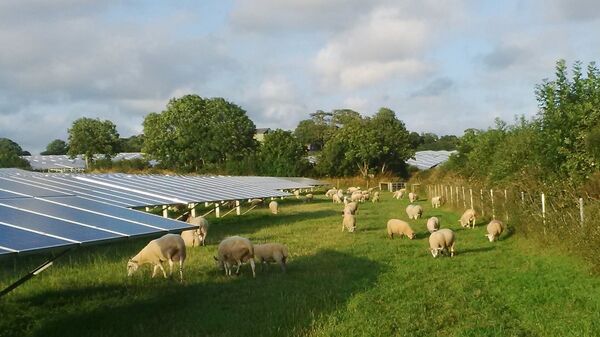Hundreds of farmers across Britain have turned to harvesting the sun's rays, instead of crops, as they seek to diversify in tough times. On Monday, October 2, the NFU launched its own suggestions for a Domestic Agricultural Policy, which would replace the EU's Common Agricultural Policy (CAP) after Brexit.
"What is clear is farming's appetite to move to a new way of doing things that promotes greater productivity on farm, protects and enhances the environment, and guards against volatility in the sector," said NFU President Meurig Raymond.
Dr. Jonathan Scurlock, the National Farmers' Union's Chief Adviser on Renewable Energy and Climate Change, told Sputnik there were now 1,250 solar farms in England and Wales.
"They range from fields providing one or two megawatts up to 70 megawatts and account for between a half and two-thirds of the solar capacity in this country, which is now up to 13 gigawatts," Dr. Scurlock told Sputnik.
He said the beauty of solar panels was that they allowed farmers to graze sheep on the grass underneath, bringing in two revenue streams on the same piece of land.
Dr. Scurlock said innovations like solar farms, electric tractors and other forms of robotics had to be the way for farmers to survive in the post-Brexit era.

Dr. Scurlock, who is talking at a national conference on solar storage in Birmingham on Wednesday, October 4, said the boom in solar farming had happened very recently, since 2010.
"The government launched a feed-in tariff and they thought it would be quite small scale but the UK has joined other countries, like Germany and Spain, which are now part of a worldwide supply chain," Dr. Scurlock told Sputnik.
"Advances in materials mean that solar modules are much cheaper and we have reached a breakthrough point… All you need is a power supply contract and planning consent and you're away," he said, who said planning permission was usually fairly easy to obtain.
"You can usually hide them away and you would only see them if you flew over the countryside. If solar is done well most people will be unaffected. All you will see is a blue shimmer, which will be just another color along with yellow fields of rapeseeds and green fields of crops," Dr. Scurlock said.
But the NFU has a bone to pick with the UK government because the Department of the Environment, Food and Rural Affairs (Defra) refused to consider solar farms as "agricultural land" even if sheep are grazed on it.
"That is not very helpful and there are tax derogations on agricultural land — for example freedom from inheritance tax — which solar farmers are not entitled to, so we'd like to see that change," he told Sputnik.
Dr. Scurlock said sheep and poultry were ideal to share fields with solar panels but other animals were not suited to the task.
"As long as you have sheep-proof wiring you're fine. Chickens were originally jungle birds so birds enjoy the cover that the panels provide. Goats and pigs are a no no. They are too destructive. Larger animals like cows and horses also don't work. But calves like lying underneath them," he concluded.




